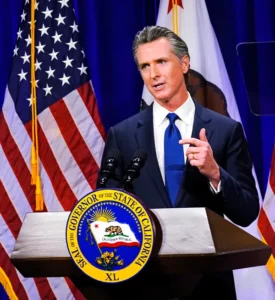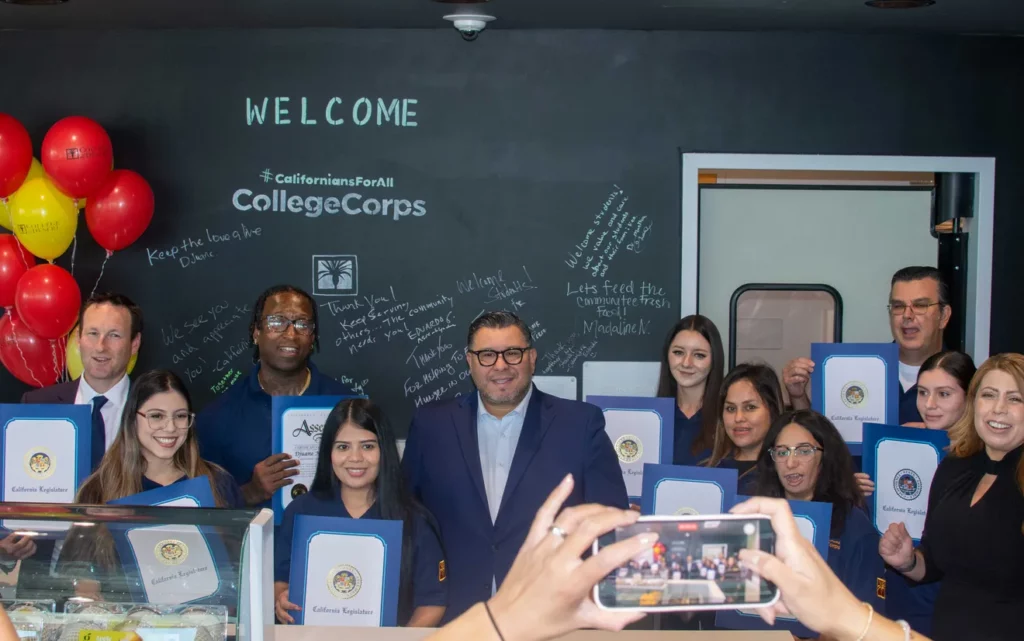The “next” Peace Corps–College Corps
College Corps could be the model for higher education America desperately needs
By Gavin Newsom, Governor of California
•
Today, our country appears more divided than ever. College Corps is an antidote to this crisis of isolation, a down payment on the reconstruction of our society and the preservation of our democracy.

Gavin Newsom is the governor of California, a former lieutenant governor of California and a former mayor of San Francisco.
Recently, I had the privilege to swear in the first ever College Corps fellows, a legion of more than 3,000 students spread across nearly 50 college and university campuses who have committed to supplement their studies with community service.
In exchange for their service, California is offering $10,000 per school year to help each of them pursue a debt-free education. For those from families with modest incomes, it is enough to meet the personal financial obligation expected of Pell Grant recipients, a financial gap most often closed by student loans.
College Corps is more than just another government program. With these new fellows, California’s service corps is expected to be larger than the U.S. Peace Corps in four years.
A system of service – not entitlement
College Corps is not an entitlement. Students will receive $10,000 in exchange for 450 hours of service. They will also receive training and professional development while earning academic credit for their experience.
In their service, these students will be exposed to a range of meaningful career options they might pursue – teaching, jobs in the clean energy economy, or working in our vital food systems.
Many fellows will devote their service to tutoring students in K-12 schools, providing the kind of individualized instruction President Joe Biden has called for in his National Partnership for Student Success initiative. For children who are still recovering from interrupted learning during the pandemic, giving them the chance to interact with a college student and mentor can be life changing.
Others in College Corps will devote their service to climate actions helping our state achieve carbon neutrality by 2045, or improving the fire resiliency of our landscapes, or combating food insecurity by serving at food banks or food distribution centers.
U.N. secretary-general:The world’s population is reaching 8 billion. What this means for the family of humanity.
The entire spectrum of California’s higher education network is participating in this program – community colleges, California State University, the University of California and private institutions. In some regions, schools have teamed up to form alliances bringing students from urban and rural campuses together.
Rebuilding connection to education
That’s a big part of what this is about – connecting people to one another. We must find ways to restore the social contract between government and its citizens. That is what College Corps represents. It’s a contract that says if you work hard and dedicate yourself in service to others, you will be rewarded with opportunity.
And in the process, you will meet people from other walks of life, work with them toward a common goal and hopefully develop some common understanding.
That is how we build the bonds that hold a society together. As proponents of pluralism and diversity, we must also promote our commonality and shared humanity. That is the big idea behind College Corps. A reminder and reaffirmation of the things that connect us to one another.
We all know the stakes are high. The American experiment – the radical notion that a country can bind together not only because of common background or ancestry, but on shared ideals and common purpose – is at risk.
Today, our country appears more divided than ever. We feel disconnected from each other, and that lack of common understanding is reflected in our increasingly toxic politics.
College Corps is an antidote to this crisis of isolation and division, a down payment on the reconstruction of our society and the preservation of our democracy.
And I truly believe that this relatively modest investment can not only change lives but also change the way we live.
As Bobby Kennedy said, “Surely this bond of common faith, this bond of common goal, can begin to teach us something. … And surely we can begin to work a little harder to bind up the wounds among us and to become in our own hearts brothers and countrymen once again.”
Gavin Newsom is the governor of California, a former lieutenant governor of California and a former mayor of San Francisco.

This is a good program and I wish the participants well. I think it really is a paid internship. There are aspects of this which remind me of Americorps. Also, there are many different “service” organizations who are working as volunteers in schools to tutor and mentor. I am a member of one where retired teachers are tutoring, voluntarily. I think it very important not to make “service” the goal. The help offered to children should be the main focus.
I wish Peace Corps would look at programs which the Public Health Service and the military have. There, full ride scholarships are offered to qualified undergrads to major in needed specialities. Then, the receipients, in turn, commit to spending so many years in the Public Health Service or the military.
The first goal of Peace Corps is to send “trained” Volunteers to interested countries. I think more should be done to fulfil the First Goal. Scholarships before service would help to meet the need. in my opinion.